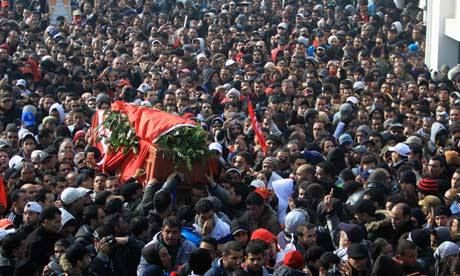News
You are here
Tunisia: permanent revolution

March 1, 2013
On Friday February 8 Tunisia’s most powerful trade union, The General Union of Tunisian Workers (UGTT), coordinated a strike to coincide with the funeral for Chokri Belaid, the assassinated head of the Democratic Patriots Party.
Two years ago a similar general strike drove Western-backed dictator Ben Ali from the country, but the social and economic demands of the revolution have still not been met. The government narrowly avoided a general strike a few months ago, but the response to the assassination of Belaid made the general strike unstoppable.
More than a thousand protestors took to the streets to demonstrate outside the Interior Ministry office, against Belaid’s death. The protestors built barricades on Habib Bourguiba Avenue, the very same spot where Tunisia led the beginning of the Arab Spring revolution, two years ago.
Although the party is denying any involvement, Chokri Belaid’s family and supporters believe the ruling Ennahda party to be responsible for his death. Belaid was a secular opponent of the party, a strong union activist, and was a leading member of the Popular Front, an umbrella organization of 12 opposition parties (including his own Democratic Patriots); which became legal after the Tunisian revolution.
The outcry against Chokri's death has found its loudest voice from the unions and workers, resulting in the largest general strike Tunisia has seen since 1978. The rift between the government and workers will continue to grow, and as former Prime Minister Hamdi Jebali said, killing Belaid was "a political assassination and the assassination of the Tunisian revolution." Jebali resigned from his position as Prime Minister mainly because his plans for a cabinet of technocrats to prepare for elections collapsed due to opposition from his own party, Ennahda party.
Although it has been two years since the beginning of the revolution, the workers and their allies have not forgotten why they took to the streets to begin with. A friend of Chokri Belaid, university professor Mohamman Souissi points out that the person(s) responsible for Belaid's death, targeted him for his ideas and his criticism of the ruling party’s influence in the government. "Belaid is someone, who made people think and that's what Tunisians need. Now the country is waking up,’ said Soussi. In a time of much conflict for the Tunisian people, solidarity amongst leftist groups and workers is essential to achieve the demands of the permanent revolution.
Section:










